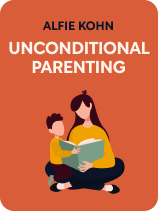

This article is an excerpt from the Shortform book guide to "Unconditional Parenting" by Alfie Kohn. Shortform has the world's best summaries and analyses of books you should be reading.
Like this article? Sign up for a free trial here .
Should you reward children’s good behavior while punishing bad behavior? Does rewarding good behavior help or harm kids in the long run?
Author Alfie Kohn cautions that it’s easy for parents to forget about long-term goals when busy or overwhelmed, instead shifting their focus to whether or not a child is being “good” or “bad” at any given moment. Kohn says creating a system of rewards and punishments leads to potentially harmful outcomes in children.
Read on to learn Kohn’s advice about rewarding good behavior, including his examples of rewards for children.
Rewarding Good Behavior & Conditional Parenting
This concept of “good” and “bad” behavior, and the system of rewards and punishments that springs up to reinforce it, entangles both parents and children so deeply that it can be hard to see alternatives. Kohn identifies several problems with this disciplinary system of rewarding good behavior, but the central one is that rewards and punishments make children feel that their parents’ love, approval, and affection are contingent on them behaving well.
Parents commonly use rewards (or the promise of rewards) to encourage good behavior. Kohn’s definition of rewards is extremely broad: He groups intangible rewards such as hugs and praise with more conventional ones such as food and gold stars.
What Counts as a Reward?
A reward is anything a child receives in return for “good” behavior. Rewards include:
- Gifts, food, and money
- Good grades
- Gold stars
- Affection
- Praise
(Shortform note: Kohn singles out one type of praise, “good job!”, as particularly noxious, as it frames whatever a child is doing as a “job” to be judged negatively or positively. While it’s probably a good idea to stop reflexively bombarding kids with “good job!” for every tiny achievement, parenting writer Emily Oster argues that outlawing “good job” might be going too far—she points out that without “good job,” parents are left with few alternatives. She also suggests that writers like Kohn are jumping to conclusions based on limited and unconvincing data.)
Why You Should Stop Rewarding Good Behavior
According to Kohn, we shouldn’t use rewards with children because:
1. Rewarding good behavior doesn’t build intrinsic motivation. Rewards tie behavior to external incentives, rather than allowing children to discover their own internal motivation. This means that when the reward disappears, the behavior will also disappear. In fact, Kohn points out that rewards even seem to decrease intrinsic motivation. For example, one study found that rewarding very young children for helping made them less likely to help later when no reward was available. Praise has the same negative effect.
2. Rewarding good behavior creates pressure to succeed. Research shows that academic pressure can cause intense stress, which in turn leads to substance abuse, depression, and anxiety. Kohn argues that pressure to succeed is especially damaging in competitive situations, when one person’s success comes at the expense of someone else’s. In these situations, children are more likely to take shortcuts (for example, cheating on a test).
3. Rewards for good behavior can become addictive. This especially applies to praise. Kohn argues that if you praise children too much, they start needing to hear it constantly to feel good about themselves. This dynamic doesn’t allow them to develop the robust, stable self-esteem that they’ll need to be happy later on.

———End of Preview———
Like what you just read? Read the rest of the world's best book summary and analysis of Alfie Kohn's "Unconditional Parenting" at Shortform .
Here's what you'll find in our full Unconditional Parenting summary :
- How to raise kids to be self-confident, independent, and compassionate
- Why you should throw away the standard parenting rulebook
- Why rewards and punishments cause more harm than good






